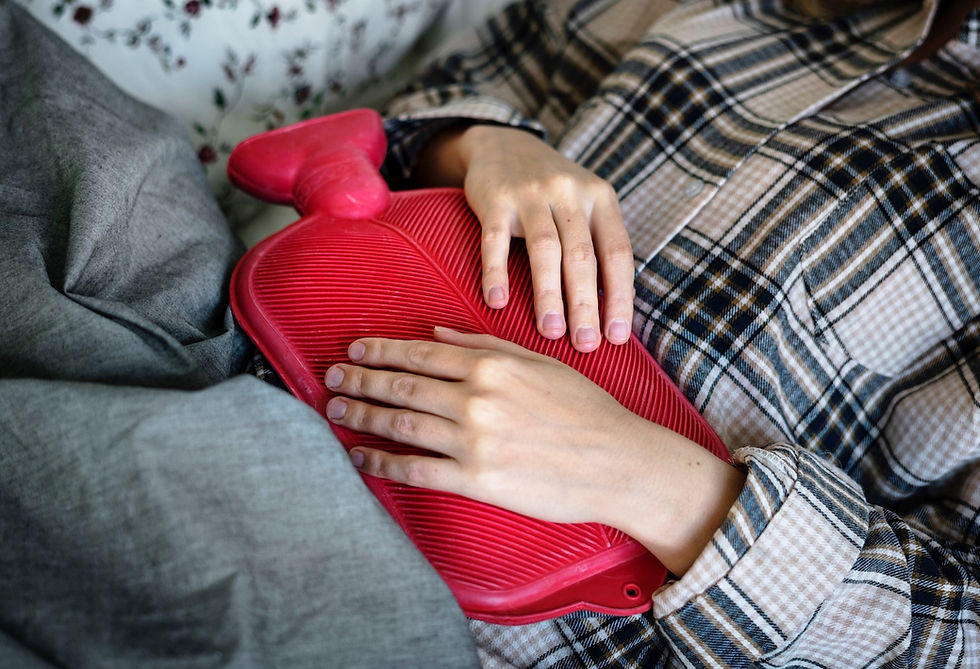Are you Sensitive to Fragrances?
- franceswalker@thefoodinto
- Aug 21, 2018
- 3 min read
Updated: Apr 8, 2025

Our world is awash fragrances. Scented laundry detergent, aftershave, perfumed shampoos, conditioners, soap, body moisturisers and deodorant, make up, cleaning products, disinfectants, air freshener, scented candles, scented toilet paper, scented air in aeroplanes, air fresheners and so much more.
One in 3 Australians react to these type of fragrant products according to an online survey conducted in 2017 (Steinemann) with varied symptoms from migraines to gut issues.
Reactions reported include
migraines
asthma attacks
rashes
dizziness
breathing difficulties
cognitive issues
gut issues
immune system problem
cardiovascular issues
and musculoskeletal problems.
The link between fragrance and headaches, respiratory issues, allergies and contact dermatitis are well documented, and although less supported, it is possible that some fragrances may act as endocrine disrupters with possible negative health consequences.
These symptoms can occur even just being near someone using a fragranced product.
The problem with scented products is not so much the smell itself as the chemicals that produce the smell.
A fragrance in a product is actually a chemical mixture of up to hundreds of chemicals with a typical fragrance containing between 100 to 350 chemicals.
When a fragrance is emitted (which can be helped considerably by being sprayed) chemicals turn into vapour in the air and attach themselves to hair, clothing, and surroundings. These chemicals are ultimately absorbed into our lungs and skin.
Some of these chemicals emitted by fragrances can be hazardous pollutants and potential carcinogens.
Professor Steinemann has found that these can be emitted by common fragranced products – including air fresheners, laundry products, cleaners and personal care products such as soaps and shampoos.
Some products we use to enhance our surroundings may be doing the exact opposite. Fragranced air fresheners are actually making the air quality worse rather than improving it!
The chemicals that make up a fragrance are a trade secret and do not have to be disclosed to protect the companies from having their products copied.
This unfortunately conceals ingredients that that consumers may wish to avoid, such as petroleum products and artificial scents. The word fragrance as one ingredient can literally mean hundreds of different chemicals that remain hidden.
Fragrance use has become more widespread due to the rise of synthetic fragrances.
The expense of extracting natural scents from biological sources has given way to the production of identical synthetic fragrances.
The 40,000 kilos of roses to make one kilo of rose essential oil is replaced at minimal cost with synthetic chemicals which identical smell.
Cheap production of synthetic fragrances means increased widespread use at levels that are more concentrated. In turn, this means greater exposure and increased potential for reactions.
Another irony is the fact that products labelled "unscented" or “fragrance-free” may actually contain fragrances used to mask the smell of certain ingredients. So not really fragrance free just a smell that is chemically suppressed so not detectible.
Fragrances and Salicylates
It is of no surprise that people who are sensitive to naturally occurring food chemicals in foods such as salicylates are often sensitive to fragrant products and other smells in their environment.
In fact, if you are doing the Royal Prince Alfred Hospital (RPAH) or FAILSAFE elimination diet (which reduces the level of salicylates, amines, glutamates and food additives in foods) it is very important to also exclude fragrances and strong smells in products and in the surrounding environment such as that emitted from new furniture, carpet and associated with house renovations.
Certain products can form part of the challenges to see if you are able to tolerate the product.
The same goes for food sensitive babies who may also react to to the fragrances in their environment. If you have a food sensitive baby, it is a good idea to minimise all smells in the baby's environment.
Summary: Fragrances in personal products and cleaning agents as well as many other products can cause specific and sometimes debilitating symptoms in 1/3 of the Australian population. If you are undergoing dietary investigation to explore your food sensitivities, it is useful to also minimise fragrances and smells.
JOIN THE COMMUNITY: BRAND NEW Dietitian led Facebook group: Amines, Salicylates and Glutamates: The Food Intolerance Dietitian for great information and community support.
REFERENCES
Steinemann A. Health and societal effects from exposure to fragranced consumer products. Preventive Medicine Reports. 2017;5:45-47. doi:10.1016/j.pmedr.2016.11.011.
Something smells off: Kate Grenville's case against fragrance. The Conversation. 16/02/2017. Accessed 20/08/18. Accessed from: https://theconversation.com/something-smells-off-kate-grenvilles-case-against-fragrance-71558
Breakey, J. Are You Food Sensitive? Diet investigations just for you. CE Breakey (Medical) Pty Ltd, 1998.
Could you have fragrance sensitivity? Medibank live better. 14/08/2017. Accessed on: 21/08/17. Accessed from: https://www.medibank.com.au/livebetter/be-magazine/wellbeing/could-you-have-fragrance-sensitivity/




Comments